Just blog to show off some video taken while in Rwanda. The video isn't always the best quality, but
Enjoy!
This first video is from the back of a mototaxi riding into downtown.
The second part of the adventure we climb the last part of the hill and arrive in the city center.
Next up is a sunset drive through Kacyrui village in Kigali. The American Embassy can see to the right at the top of the video. The audio is a bit loud, so turn down your audio before watching.
The final video is a bit bumpy but it give you a look at village life in Northern Rwanda.
Turtle Stew
Sunday, April 10, 2011
Friday, March 4, 2011
Rwandan Cooking
Long time no blog! I have started a few, but I've failed at completing them. I hope to back to them soon, but for now here is a quick photo tour of cooking in Rwanda.
The title of this blog my be a bit misleading. This is not a blog about Rwandan food (which deserves its own blog), but rather a blog about the food I cook in Rwanda. I have never been more challenged in my cooking than I have been here in Rwanda. The main challenges come in two forms; the first is in the limited variety of food available and the second is in the cost.
I'm fortunate to have come from a family that really enjoys food. Both my Mother and Father are great cooks and they both have totally different styles. My Father is an Asian loving soup maker and my Mother is a bit more traditional. I began baking at an early age and by the age of 8 I was baking chocolate chip cookies on my own.
Living aboard has taught me to be flexible and creative. Some people pack a first aid kit, I pack a spice kit. I never know what herbs and spices I will find and not find so it's better to be safe than sorry. My basic kit contains, Mexican chili, cumin, basil, oregano, onion powder, garlic powder, curry, dill, thyme and lots of stock. If it is a longer trip I will pack just about whatever I have and use up the last ounce in my suitcase. I used to pack hair products, but really isn't what ponytails are for?
The basic fresh ingredients in Rwanda include potatoes, green bananas, green beans, carrots, onions, garlic, eggplant, green peas, zucchini, green peppers, and cabbage. As for fruit you're looking at passion fruit, bananas (both the big and small variety), mango and pineapple. When it comes to meat you can easily find goat and beef. Pork is a bit harder to find and you don't want to eat the chicken here. The fish is mostly fishy tilapia from local fish farms. As for dairy, it easy to come across milk, yogurt, Rwandan Gouda and buttermilk. Not bad you say? Well really that's it anything not on this list is exotic and can be difficult to find. We get very excited about broccoli.
 Our first meals came in the form of lots and lots of soups. One of our more infamous soups was the result of ordering 3 whole chickens instead of the pieces of chicken at our local pub. It was also the last time we have ordered chicken.
Our first meals came in the form of lots and lots of soups. One of our more infamous soups was the result of ordering 3 whole chickens instead of the pieces of chicken at our local pub. It was also the last time we have ordered chicken.
Swedish ice cream buckets make great spice kits.
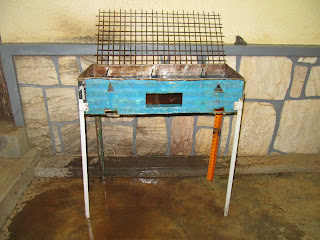 The purchase of our grill has greatly advanced the food items we are able to cook. Our favorites include grilled veggies and pizza. The tricky part of making the pizza is to get the cheese nice and melty. Our grill was purchased at the local metal works shop. They turn old barrels into grills, fish fryers, coal shovels and dinning room tables.
The purchase of our grill has greatly advanced the food items we are able to cook. Our favorites include grilled veggies and pizza. The tricky part of making the pizza is to get the cheese nice and melty. Our grill was purchased at the local metal works shop. They turn old barrels into grills, fish fryers, coal shovels and dinning room tables.
Some of the most exciting discoveries I've made include how to make sour cream, how easy it is to make pickles (using cumbers from our garden), yogurt makes a great substitute for many things, flat bread is fantastic and easy to make, green beans can go in anything!
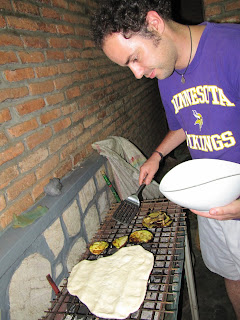 Joss precooks one side of the pizza.
Joss precooks one side of the pizza.
Note the grilled eggplant a pizza topping staple.
 The finished product here is a beef fajita pizza. With some feta brought in from Ireland.
The finished product here is a beef fajita pizza. With some feta brought in from Ireland.
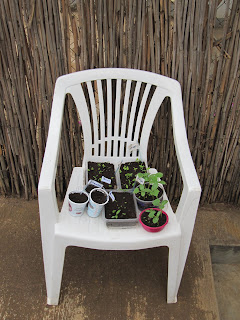 Our flavors have greatly improved since the planting of a few herbs and spices. The fresh lettuce has been a great addition to our meals. This is the start of our city garden. We have grown corn, tomatoes, herbs, cucumber, zucchini, bell pepper and lettuce. It will be sad to say goodbye, but we hope the next tenants will be appreciative.
Our flavors have greatly improved since the planting of a few herbs and spices. The fresh lettuce has been a great addition to our meals. This is the start of our city garden. We have grown corn, tomatoes, herbs, cucumber, zucchini, bell pepper and lettuce. It will be sad to say goodbye, but we hope the next tenants will be appreciative.
The title of this blog my be a bit misleading. This is not a blog about Rwandan food (which deserves its own blog), but rather a blog about the food I cook in Rwanda. I have never been more challenged in my cooking than I have been here in Rwanda. The main challenges come in two forms; the first is in the limited variety of food available and the second is in the cost.
I'm fortunate to have come from a family that really enjoys food. Both my Mother and Father are great cooks and they both have totally different styles. My Father is an Asian loving soup maker and my Mother is a bit more traditional. I began baking at an early age and by the age of 8 I was baking chocolate chip cookies on my own.
Living aboard has taught me to be flexible and creative. Some people pack a first aid kit, I pack a spice kit. I never know what herbs and spices I will find and not find so it's better to be safe than sorry. My basic kit contains, Mexican chili, cumin, basil, oregano, onion powder, garlic powder, curry, dill, thyme and lots of stock. If it is a longer trip I will pack just about whatever I have and use up the last ounce in my suitcase. I used to pack hair products, but really isn't what ponytails are for?
The basic fresh ingredients in Rwanda include potatoes, green bananas, green beans, carrots, onions, garlic, eggplant, green peas, zucchini, green peppers, and cabbage. As for fruit you're looking at passion fruit, bananas (both the big and small variety), mango and pineapple. When it comes to meat you can easily find goat and beef. Pork is a bit harder to find and you don't want to eat the chicken here. The fish is mostly fishy tilapia from local fish farms. As for dairy, it easy to come across milk, yogurt, Rwandan Gouda and buttermilk. Not bad you say? Well really that's it anything not on this list is exotic and can be difficult to find. We get very excited about broccoli.
 Our first meals came in the form of lots and lots of soups. One of our more infamous soups was the result of ordering 3 whole chickens instead of the pieces of chicken at our local pub. It was also the last time we have ordered chicken.
Our first meals came in the form of lots and lots of soups. One of our more infamous soups was the result of ordering 3 whole chickens instead of the pieces of chicken at our local pub. It was also the last time we have ordered chicken. Swedish ice cream buckets make great spice kits.
Some of the most exciting discoveries I've made include how to make sour cream, how easy it is to make pickles (using cumbers from our garden), yogurt makes a great substitute for many things, flat bread is fantastic and easy to make, green beans can go in anything!
Note the grilled eggplant a pizza topping staple.
Sunday, February 6, 2011
Road trip Nyungwe
Road trips are few and far between when you don't have a car, bike or even a bicycle. Over the New Year break a friend of ours loaned us his bike. It was the first time since our bicycles in Lund that we have had independent travel at the ready. For the most part I don't miss having a car or a motorbike in my life. It's freeing to get around the world by your own momentum and by public transport. Of course I hop on a moto taxi from time to time, but more often than not it's a taxi bus or walking. That said when the opportunity came around for us to bike-sit we jumped on it and then we headed out of town.
 Our hot ride for the week.
Our hot ride for the week.
The final destination of choice was Nyungwe park, about a 5 - 6 hour ride south then west of Kigali. We chose to stop off halfway in Butare. Butare is a lovely city in the heart of Rwanda. Both the National Museum and University are located here. I had been to Butare several times for work. I don't have many photos of Butare, but I can tell you it has the best coffee shop/ shop in all of Rwanda. It also just happens to be owned by the same Lebanese that own the shop near our home in Kigali.
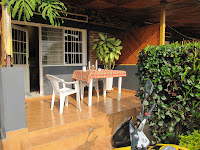
This is a photo of our hotel for the night. Really a lovely way to start the day, too bad the "eggs" were bight yellow and as leathery as a duck's backside. Coffeed up it time to hit the road for day two.
From Butare it was a 4 hour drive into the mountains. Windy roads too us from village to village. We stopped every now and again for a butt rest and a delicious warm coke. Our conversations with the locals was limited to the few words of Kinyarwanda we have picked up over the past 6 months. Usually, someone would come out of the eucalyptus speaking fantastic English and delighted to try it on us. It is really humbling to meet someone who comes from such a remote area and has taken it upon themselves to learn you language.

Upon reaching the edge of the rain forest a tea plantation acts as a buffer between the old Rwanda and the new. It is hard to believe that not so long ago Rwanda was not rolling hills of eucalyptus, pine and banana trees. This development is reality new to Rwanda and the result of Western influence and colonialism. The pros and cons of which are a whole other topic.
As we drove into the park the pine, tea and eucalyptus was replaced with dence vegetation of a closed canopy rain forest. Bird and monkey sightings grew more and more frequent. We drove for about an hour and reached the center of the park. The road that runs through the park is still the main road to Cyangugu, which is on the southern tip of Lake Kivu boarding the Congo. This means all traveling between Kigali and Cyangugu travel this road. Once in the park, the police no longer have jurisdiction, which means the speeds increase as do the number of cars and trucks on their sides.
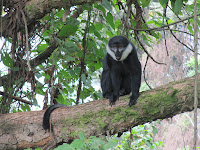
The park does not receive a large number of tourists. Which is great as a visitor, but makes it difficult for the park to sustain itself. There were over a dozen rental houses and we were the only guests.
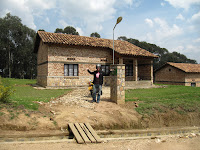
The next morning we were up early and ready for a hike in the forest. We had hoped to track the chimpanzees, but unfortunately they were too far away. We settled on a 10km hike to a look out point. Nyungwe is one of the largest mountain forests in Africa. The flora and fauna are particularly unique and important, as due to it's location and altitude within the Albertine Rift it was largely unaffected by the last ice age. The park is host to almost 300 birds, 200 types of trees, countless flowers and an exciting 13 species of primate. (http://www.rwandatourism.com/parks.htm)

The hike took about 4 hours. We were fortunate that the hike passed throughout a variety if terrain, which allowed us to enjoy a wide variety plants. The final vista gave us a 360 view of the park. To the south was Burundi, the west was the DRC and to the north the Volcanoes of Rwanda.
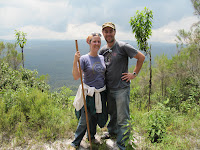
 Our hot ride for the week.
Our hot ride for the week. The final destination of choice was Nyungwe park, about a 5 - 6 hour ride south then west of Kigali. We chose to stop off halfway in Butare. Butare is a lovely city in the heart of Rwanda. Both the National Museum and University are located here. I had been to Butare several times for work. I don't have many photos of Butare, but I can tell you it has the best coffee shop/ shop in all of Rwanda. It also just happens to be owned by the same Lebanese that own the shop near our home in Kigali.
This is a photo of our hotel for the night. Really a lovely way to start the day, too bad the "eggs" were bight yellow and as leathery as a duck's backside. Coffeed up it time to hit the road for day two.
From Butare it was a 4 hour drive into the mountains. Windy roads too us from village to village. We stopped every now and again for a butt rest and a delicious warm coke. Our conversations with the locals was limited to the few words of Kinyarwanda we have picked up over the past 6 months. Usually, someone would come out of the eucalyptus speaking fantastic English and delighted to try it on us. It is really humbling to meet someone who comes from such a remote area and has taken it upon themselves to learn you language.
Upon reaching the edge of the rain forest a tea plantation acts as a buffer between the old Rwanda and the new. It is hard to believe that not so long ago Rwanda was not rolling hills of eucalyptus, pine and banana trees. This development is reality new to Rwanda and the result of Western influence and colonialism. The pros and cons of which are a whole other topic.
As we drove into the park the pine, tea and eucalyptus was replaced with dence vegetation of a closed canopy rain forest. Bird and monkey sightings grew more and more frequent. We drove for about an hour and reached the center of the park. The road that runs through the park is still the main road to Cyangugu, which is on the southern tip of Lake Kivu boarding the Congo. This means all traveling between Kigali and Cyangugu travel this road. Once in the park, the police no longer have jurisdiction, which means the speeds increase as do the number of cars and trucks on their sides.
The park does not receive a large number of tourists. Which is great as a visitor, but makes it difficult for the park to sustain itself. There were over a dozen rental houses and we were the only guests.
The next morning we were up early and ready for a hike in the forest. We had hoped to track the chimpanzees, but unfortunately they were too far away. We settled on a 10km hike to a look out point. Nyungwe is one of the largest mountain forests in Africa. The flora and fauna are particularly unique and important, as due to it's location and altitude within the Albertine Rift it was largely unaffected by the last ice age. The park is host to almost 300 birds, 200 types of trees, countless flowers and an exciting 13 species of primate. (http://www.rwandatourism.com/parks.htm)
The hike took about 4 hours. We were fortunate that the hike passed throughout a variety if terrain, which allowed us to enjoy a wide variety plants. The final vista gave us a 360 view of the park. To the south was Burundi, the west was the DRC and to the north the Volcanoes of Rwanda.
Thursday, January 20, 2011
Ugandan New Years
For the end of the year we headed to Uganda for a visa run and to enjoy some time outside of Kigali. It was a real treat! Things in Uganda are so much cheaper, maybe even half price. It really reminded us of how much things cost in Rwanda. Being a land-locked country, 2 times removed from the sea and without a manufacturing industry Rwanda is in a though spot. They have however recently joined the East Africa Community and the trade agreements and lowering of barriers should help. Since we have been here we have noticed an increase of products and goods on the market.
 So anyway, we hopped on a International Bus headed to Kampala. The boarder crossing was much more simple and easy going than the first time around. They stamped us out on the Rwandan side, we crossed a bridge over a dried out stream, we paid our $50 and were welcomed back into Uganda. We hopped back onto the bus where the driver switched from driving on the right side to driving on the left and we were off! As the bus flew down the road we tried not to look at the cars passing to our right. About 20 minutes later we were at our "stop" in Kabale. The bus slowed down long enough for us to jump off at the 3 way intersection. From there we hired a car to take us the remaining 15 km to lake Bunyoni. As we wandered down the hillside the lake revealed itself and stress of the journey evaporated. The deep lake is surrounded by green hills and dotted with small resorts.
So anyway, we hopped on a International Bus headed to Kampala. The boarder crossing was much more simple and easy going than the first time around. They stamped us out on the Rwandan side, we crossed a bridge over a dried out stream, we paid our $50 and were welcomed back into Uganda. We hopped back onto the bus where the driver switched from driving on the right side to driving on the left and we were off! As the bus flew down the road we tried not to look at the cars passing to our right. About 20 minutes later we were at our "stop" in Kabale. The bus slowed down long enough for us to jump off at the 3 way intersection. From there we hired a car to take us the remaining 15 km to lake Bunyoni. As we wandered down the hillside the lake revealed itself and stress of the journey evaporated. The deep lake is surrounded by green hills and dotted with small resorts.
Ours was the Lake Bunyoni Overland Resort. We had rented a Safari tent for 5 nights. Each tent was covered by a steal roof and sat upon stilted platforms. The view from our tent was of the lake. From the restaurant, when the sky was clear, we were able to see on of the volcanoes of Rwanda. The home of the Mountain Gorillas.
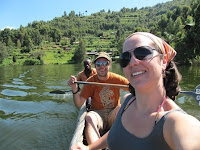 We spent our days enjoying the view and we treated ourselves to a few beers (which actually aren't the much cheaper but perhaps twice as tasty). One of the nights we were actually able to watch the Vikings play the Eagles on the dish. Neither of us knew the outcome, so it was a delight to watch Webb run over the Eagles.
We spent our days enjoying the view and we treated ourselves to a few beers (which actually aren't the much cheaper but perhaps twice as tasty). One of the nights we were actually able to watch the Vikings play the Eagles on the dish. Neither of us knew the outcome, so it was a delight to watch Webb run over the Eagles.
On our second full day we rented a dugout canoe.
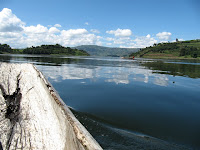 The dugouts are made from huge eucalyptus trees, which are not native to the region. (The eucalyptus and pine trees were brought to Africa by colonizers for "re"forestation purposes and have since taken over the natural flora and fauna of the region.) Being that neither of us are proficient paddlers we decided to hire a man to help us with the journey. After 45 minutes of paddling around island and past bays we arrived on the Bushara Island Camp. This is a lovely peaceful island filled with birds and wild flowers.
The dugouts are made from huge eucalyptus trees, which are not native to the region. (The eucalyptus and pine trees were brought to Africa by colonizers for "re"forestation purposes and have since taken over the natural flora and fauna of the region.) Being that neither of us are proficient paddlers we decided to hire a man to help us with the journey. After 45 minutes of paddling around island and past bays we arrived on the Bushara Island Camp. This is a lovely peaceful island filled with birds and wild flowers.
The Irish housemate and her sister arrived in Bunyoni just in-time for New Years. We ventured down the road to the newly opened Bird's Nest and enjoyed a New Year's feast. After dinner we enjoyed a huge bonfire with the sounds of drumming floating over the lake. On walk back to our resort the village was filled with excitement and children ran up to us to wish a Happy New Year.

Back in our resort we brought in the New Year with a bit of Ugandan rum and whiskey. Some of us were in the view that it wasn't as bad as expected, while others thought it was better than expected. I guess there really is only one way for you to find out.
 So anyway, we hopped on a International Bus headed to Kampala. The boarder crossing was much more simple and easy going than the first time around. They stamped us out on the Rwandan side, we crossed a bridge over a dried out stream, we paid our $50 and were welcomed back into Uganda. We hopped back onto the bus where the driver switched from driving on the right side to driving on the left and we were off! As the bus flew down the road we tried not to look at the cars passing to our right. About 20 minutes later we were at our "stop" in Kabale. The bus slowed down long enough for us to jump off at the 3 way intersection. From there we hired a car to take us the remaining 15 km to lake Bunyoni. As we wandered down the hillside the lake revealed itself and stress of the journey evaporated. The deep lake is surrounded by green hills and dotted with small resorts.
So anyway, we hopped on a International Bus headed to Kampala. The boarder crossing was much more simple and easy going than the first time around. They stamped us out on the Rwandan side, we crossed a bridge over a dried out stream, we paid our $50 and were welcomed back into Uganda. We hopped back onto the bus where the driver switched from driving on the right side to driving on the left and we were off! As the bus flew down the road we tried not to look at the cars passing to our right. About 20 minutes later we were at our "stop" in Kabale. The bus slowed down long enough for us to jump off at the 3 way intersection. From there we hired a car to take us the remaining 15 km to lake Bunyoni. As we wandered down the hillside the lake revealed itself and stress of the journey evaporated. The deep lake is surrounded by green hills and dotted with small resorts.
Ours was the Lake Bunyoni Overland Resort. We had rented a Safari tent for 5 nights. Each tent was covered by a steal roof and sat upon stilted platforms. The view from our tent was of the lake. From the restaurant, when the sky was clear, we were able to see on of the volcanoes of Rwanda. The home of the Mountain Gorillas.
 We spent our days enjoying the view and we treated ourselves to a few beers (which actually aren't the much cheaper but perhaps twice as tasty). One of the nights we were actually able to watch the Vikings play the Eagles on the dish. Neither of us knew the outcome, so it was a delight to watch Webb run over the Eagles.
We spent our days enjoying the view and we treated ourselves to a few beers (which actually aren't the much cheaper but perhaps twice as tasty). One of the nights we were actually able to watch the Vikings play the Eagles on the dish. Neither of us knew the outcome, so it was a delight to watch Webb run over the Eagles. On our second full day we rented a dugout canoe.
 The dugouts are made from huge eucalyptus trees, which are not native to the region. (The eucalyptus and pine trees were brought to Africa by colonizers for "re"forestation purposes and have since taken over the natural flora and fauna of the region.) Being that neither of us are proficient paddlers we decided to hire a man to help us with the journey. After 45 minutes of paddling around island and past bays we arrived on the Bushara Island Camp. This is a lovely peaceful island filled with birds and wild flowers.
The dugouts are made from huge eucalyptus trees, which are not native to the region. (The eucalyptus and pine trees were brought to Africa by colonizers for "re"forestation purposes and have since taken over the natural flora and fauna of the region.) Being that neither of us are proficient paddlers we decided to hire a man to help us with the journey. After 45 minutes of paddling around island and past bays we arrived on the Bushara Island Camp. This is a lovely peaceful island filled with birds and wild flowers. The Irish housemate and her sister arrived in Bunyoni just in-time for New Years. We ventured down the road to the newly opened Bird's Nest and enjoyed a New Year's feast. After dinner we enjoyed a huge bonfire with the sounds of drumming floating over the lake. On walk back to our resort the village was filled with excitement and children ran up to us to wish a Happy New Year.

Back in our resort we brought in the New Year with a bit of Ugandan rum and whiskey. Some of us were in the view that it wasn't as bad as expected, while others thought it was better than expected. I guess there really is only one way for you to find out.
Tuesday, January 11, 2011
Christmas in Kigali
Ah the Holidays. A time for being with friends and family and most importantly a time to take a break! The research has been going well, but the past 2 months have been a bit intense to say the least. It easy to underestimate the energy it takes to head into the field on a weekly basis and I am feeling a bit drained from the information overload. 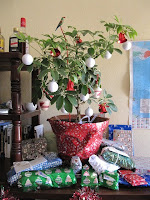
So, thankfully Christmas came just in-time to give us a much needed break. Rwanda is a predominantly Christan with 90% of the population either Roman Catholic, Protestant, or Seventh-day Adventist (according to Wikipedia). Unlike most Western countries Rwanda's Christmas is focused on celebration rather then Santa and the practice of gift giving. Of course there were a limited amount of lights and plastic ornaments being sold in the markets, but they did not dominate the celebration.
As expats we channeled the familiarities of our homes and bought a few small gifts, picked out a tree and put up a few bobs and bits. Joss picked up our tree at a local green house. We hoped to buy a local variety, but unfortunately they are not popular enough to sell. We ended up with variegated rubber tree, much like the one my brother liked to eat as a child. The tree was decorated and a bird on a stick was our topper. Gifts were wrapped, piled around and the scene was set.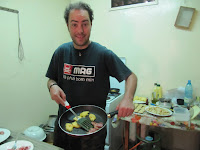
While most Rwandan's went to Church, Mid-night Mass and Christmas morning Mass, our house cozied up with a few candles, Christmas music, sugar cookies and nice glass of wine. On Christmas morning our resident Aussie grilled up some ham and pineapple (a Christmas tradition in his house).
 To mark the occasion we used our oven for the 2nd time (the first was for a Thanksgiving apple pie). We bought a fat chicken at the local supermarket, which really is huge a treat. Chickens in Rwanda leave much to be desired. They have very little meat and what is there is tough and dark. No matter how it is cooked it tastes a smokey. Our chicken was juicy and lovely. The leftovers were made into a fantastic Minnesota wild rice soup (Don't know what that is? Your life is not complete. Come visit me in MN the next time I'm there.) The meal was rounded out with stuffing, roasted potatoes, green beans and a lovely salad topped with Wendy's pomegranate dressing (thanks Mom). So nice to take a break from it all and treat ourselves.
To mark the occasion we used our oven for the 2nd time (the first was for a Thanksgiving apple pie). We bought a fat chicken at the local supermarket, which really is huge a treat. Chickens in Rwanda leave much to be desired. They have very little meat and what is there is tough and dark. No matter how it is cooked it tastes a smokey. Our chicken was juicy and lovely. The leftovers were made into a fantastic Minnesota wild rice soup (Don't know what that is? Your life is not complete. Come visit me in MN the next time I'm there.) The meal was rounded out with stuffing, roasted potatoes, green beans and a lovely salad topped with Wendy's pomegranate dressing (thanks Mom). So nice to take a break from it all and treat ourselves.
 After dinner gifts were handed out and I found myself after 33 year still playing Santa. Our gift choices reflected our place in the world and things important to us, books, chocolate and small stuffed animals from the savanna (all except the animals are a real treat). It is such liberating feeling not to be bogged down by the over-consumerism of the Western Christmas. That said it was also wonderful to make Hesron's day by giving him a Manchester United jersey.
After dinner gifts were handed out and I found myself after 33 year still playing Santa. Our gift choices reflected our place in the world and things important to us, books, chocolate and small stuffed animals from the savanna (all except the animals are a real treat). It is such liberating feeling not to be bogged down by the over-consumerism of the Western Christmas. That said it was also wonderful to make Hesron's day by giving him a Manchester United jersey.
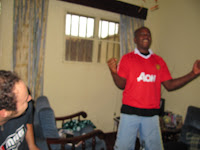 Wherever and however you spent it, I hope your Christmas was as lovely and perfect as ours.
Wherever and however you spent it, I hope your Christmas was as lovely and perfect as ours.

So, thankfully Christmas came just in-time to give us a much needed break. Rwanda is a predominantly Christan with 90% of the population either Roman Catholic, Protestant, or Seventh-day Adventist (according to Wikipedia). Unlike most Western countries Rwanda's Christmas is focused on celebration rather then Santa and the practice of gift giving. Of course there were a limited amount of lights and plastic ornaments being sold in the markets, but they did not dominate the celebration.
As expats we channeled the familiarities of our homes and bought a few small gifts, picked out a tree and put up a few bobs and bits. Joss picked up our tree at a local green house. We hoped to buy a local variety, but unfortunately they are not popular enough to sell. We ended up with variegated rubber tree, much like the one my brother liked to eat as a child. The tree was decorated and a bird on a stick was our topper. Gifts were wrapped, piled around and the scene was set.
While most Rwandan's went to Church, Mid-night Mass and Christmas morning Mass, our house cozied up with a few candles, Christmas music, sugar cookies and nice glass of wine. On Christmas morning our resident Aussie grilled up some ham and pineapple (a Christmas tradition in his house).
Wednesday, November 24, 2010
Research Log 4 - More focus
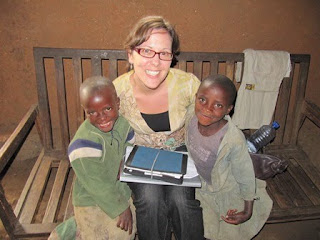
Focus Groups
A second round of focus groups were held this week. Yesterday’s groups consisted of children between the ages of 12 – 15. The children were divided into Child-Headed Households (CHH) and children from Adult-Headed Household (AHH). Since we are using consent forms for all participants we had to locate guardians to sign for these children. The irony is that it was much more difficult to locate guardians for the children from AHH than for children from CHH. The Secretary of Social Affairs was able to sign for the children from AHH, but we had to locate a parent or guardian for the other children. We were told that the guardians would be available for the children and that in fact they were present. Emily took the adults into a separate room to go over and sign the consent from while a started to explain the purpose of the research and the child’s rights on an individual basis. The problems arose after explaining and obtaining an agreement to participate from the first child. I asked him if his parent or guardian was in the next room. At this point he indicated that he came alone. I showed him the consent from with his name on it and asked who the person was that signed the document. He said he had no idea who the person was. This happen a number of times and because we did not have parent/guardianship written consent for the children we did not allow them to participate. We suspect the Sector Leaders in charge of organizing the groups organized these random adults to sign for these children, however in an effort to retain face on their behalf we did not bring this issue up with them. Thankfully, we had enough children to participate in each group. Emily interviewed children from CHH while I interviewed children from AHH.
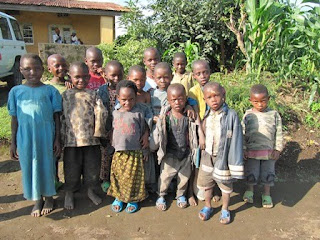 Overall I found the children more open and easier to get to participate than the adult focus groups. We played a few games at the start and in the middle of the group meeting. This seemed to help the children feel comfortable and open to the idea of the group. We also provided each child with a Fanta and a muffin at the start of the group meeting.
Overall I found the children more open and easier to get to participate than the adult focus groups. We played a few games at the start and in the middle of the group meeting. This seemed to help the children feel comfortable and open to the idea of the group. We also provided each child with a Fanta and a muffin at the start of the group meeting. Since my group turned out to be 5 girls and 1 boy, the information I received was heave on the female perspective. The 1 boy did speak, but not a lot. However, the main purpose of the focus group was to get an overview of the topic and situation in Muko. We also intend to have semi-structured interviews after the household surveys have been completed. We will interview both boys and girls and this will help to create a gender balance research.
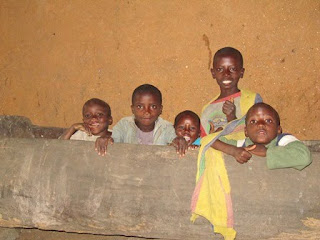 Household Surveys
Household Surveys Pilot Household Surveys were held today. As we suspected our surveys are too long and can take over 2 hours to complete depending on the number of people living in the home. After today’s test surveys will modify the survey as needed. We intend to return to the field next week with the modified surveys to complete the household surveys over 2 days.
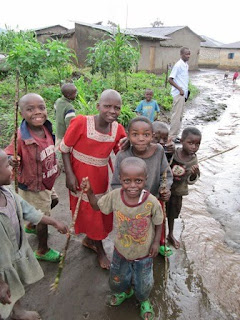
During my 2nd interview a rain storm hit Muko. We had to stop the interview since the home we were in had a corrugated tin roof and the thundering sound forced us to take a break from the interview. In the darkness of the mud house I pulled out my camera to entertain the children that had been listening in on the interview and showing off by counting, saying the days of the week and reciting the alphabet all in English. They quickly hammed it up and posed all around the room. The photo shows the children in a dugout tree that was in the house. This is a photo on the streets of Muko shortly after the storm passed.
Wednesday, November 17, 2010
Research Log 3 - Defining Terms
Focus Groups
I held my first focus groups on Monday. With the assistance of the sector leaders 3 groups were scheduled and invited to participate. The groups were Cell Leaders, Primary and Secondary school Teachers and members of the Parent Teacher Association. The purpose of these purposefully selected focus groups was to gain an understanding of the perceived situation in Muko regarding child labor and education. Unfortunately (but unsurprising), the organization and scheduling of the groups was not as planned. Instead of having participants arrive at a designated hours throughout the day, all of the participants arrived at 9 am, which was the first time slot. I had no choice but to apologize to the participants and explain the misunderstanding.
Each focus group lasted between 1.5 and 2 hours. Despite knowing that Rwandans are reserved, we opted for focus groups (rather than semi-formal individual interviews) in order to gain a greater initial amount of data. As we are employing Grounded Theory, this data will be used to adjust our focus and related questions. The focus groups did not generate as much discussion and data as I had hoped, but they definitely opened the door to the understanding the perceptions held by the community leaders.
Defining Terms
The purpose of the focus groups in part was to define terms such as; at what age does a person become an adult, what is a Child-Headed Household, what is domestic (unpaid) labor, and what is agricultural (unpaid) labor. It was relativity easy to define the age of adult hood as well as what considered to be Child-Headed House. It was much more difficult to draw a line between agricultural work and domestic labor. It may prove difficult to differentiate between the two as our research continues as it is very easy for conversation to switch between the two. We will have to consider how to deal with this issue as we move forward.
Children Focus Groups
Hopefully before the end of this week or at the beginning of next week I (we if it is next week, Emily will return to Kigali this weekend) will return to Muko to conduct focus groups with children. As with the adult focus groups, these groups will not be for gaining in-depth information. They will serve as an introduction to the perceptions and realities that the children are facing. I have set aside more time to work with the children as it is important to make them feel comfortable as well as to make sure they understand the purpose of the research. I will also use games at various times of the discussion to keep them interested and active. This will also help create a higher level of comfort and interest.
At this point we have divided the children into children from Children-Headed Households and children from Adult-Headed Households. The ages of the children are to between 12 and 15. I have opted not to divide the children into male and female groups. If this proves to be hindrance on participation I will further divide the groups into male and female groups on any subsequent group discussions.
I am hopeful the children will be less guarded then the adults and more willing to openly talk. Given that the research subject is child-centric they may find the topics more interesting and worthwhile then the adults.
Semi-Structured Interview with Officials
While the Officials of Muko Sector have been supportive and have approved our research they have been a bit illusive when it comes to interviews. We may have to change tactics for gathering the information we hoped to gain from them.
I held my first focus groups on Monday. With the assistance of the sector leaders 3 groups were scheduled and invited to participate. The groups were Cell Leaders, Primary and Secondary school Teachers and members of the Parent Teacher Association. The purpose of these purposefully selected focus groups was to gain an understanding of the perceived situation in Muko regarding child labor and education. Unfortunately (but unsurprising), the organization and scheduling of the groups was not as planned. Instead of having participants arrive at a designated hours throughout the day, all of the participants arrived at 9 am, which was the first time slot. I had no choice but to apologize to the participants and explain the misunderstanding.
Each focus group lasted between 1.5 and 2 hours. Despite knowing that Rwandans are reserved, we opted for focus groups (rather than semi-formal individual interviews) in order to gain a greater initial amount of data. As we are employing Grounded Theory, this data will be used to adjust our focus and related questions. The focus groups did not generate as much discussion and data as I had hoped, but they definitely opened the door to the understanding the perceptions held by the community leaders.
Defining Terms
The purpose of the focus groups in part was to define terms such as; at what age does a person become an adult, what is a Child-Headed Household, what is domestic (unpaid) labor, and what is agricultural (unpaid) labor. It was relativity easy to define the age of adult hood as well as what considered to be Child-Headed House. It was much more difficult to draw a line between agricultural work and domestic labor. It may prove difficult to differentiate between the two as our research continues as it is very easy for conversation to switch between the two. We will have to consider how to deal with this issue as we move forward.
Children Focus Groups
Hopefully before the end of this week or at the beginning of next week I (we if it is next week, Emily will return to Kigali this weekend) will return to Muko to conduct focus groups with children. As with the adult focus groups, these groups will not be for gaining in-depth information. They will serve as an introduction to the perceptions and realities that the children are facing. I have set aside more time to work with the children as it is important to make them feel comfortable as well as to make sure they understand the purpose of the research. I will also use games at various times of the discussion to keep them interested and active. This will also help create a higher level of comfort and interest.
At this point we have divided the children into children from Children-Headed Households and children from Adult-Headed Households. The ages of the children are to between 12 and 15. I have opted not to divide the children into male and female groups. If this proves to be hindrance on participation I will further divide the groups into male and female groups on any subsequent group discussions.
I am hopeful the children will be less guarded then the adults and more willing to openly talk. Given that the research subject is child-centric they may find the topics more interesting and worthwhile then the adults.
Semi-Structured Interview with Officials
While the Officials of Muko Sector have been supportive and have approved our research they have been a bit illusive when it comes to interviews. We may have to change tactics for gathering the information we hoped to gain from them.
Subscribe to:
Posts (Atom)